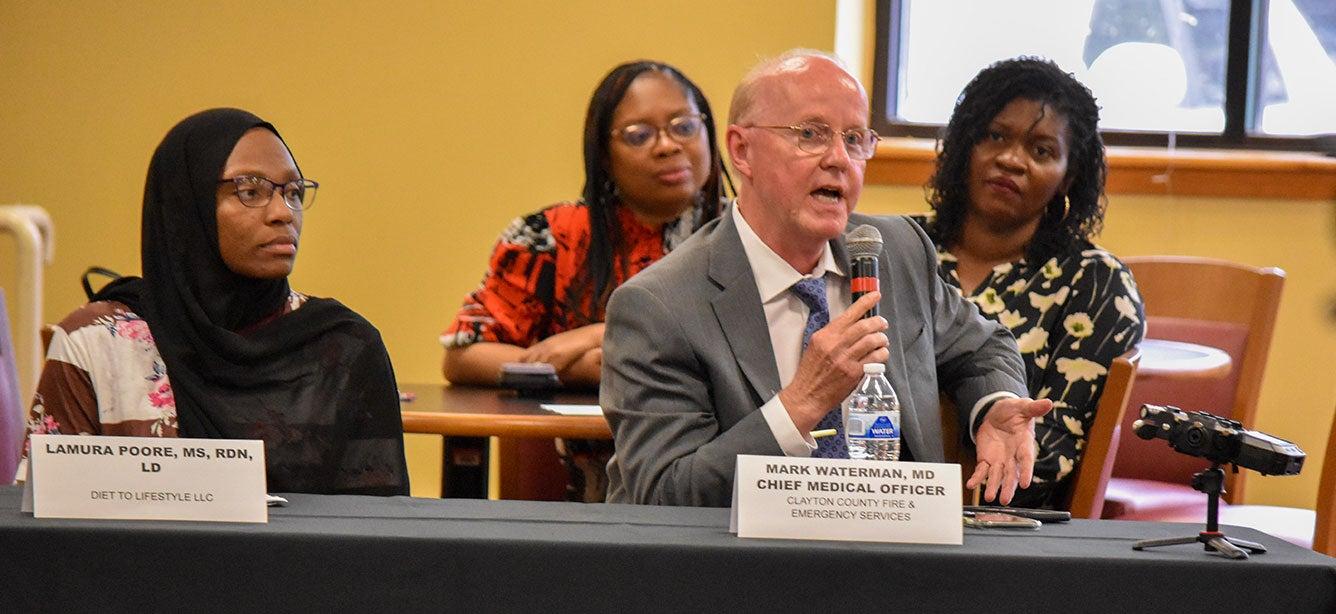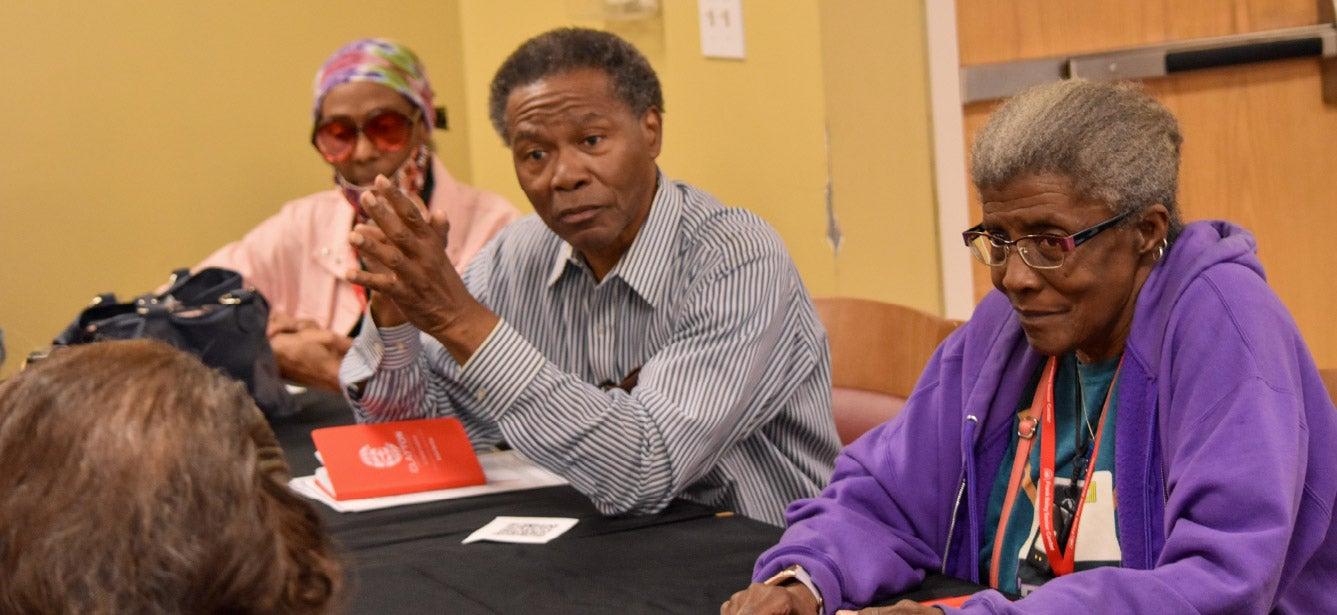
Seeking to empower older adults to self-advocate for access to health care that doesn’t stigmatize them for being overweight or obese, four different senior centers held town hall style discussions that unveiled some important findings.
The discussions arose from a partnership with the American Society on Aging (ASA) that brought four teams of ASA RISE fellows to senior centers in Atlanta, Chicago, Los Angeles, and Washington, D.C. The fellows created toolkits for each senior center to help guide the town halls, which featured presentations from medical professionals, roundtable discussions, and overviews of such programs as community gardens and ways to add nutrition and physical activity into each day.
“I think it’s all about education and repetition so they create a healthy habit,” said Maria Teresa McPhail, director of Vida Senior Centers in Washington, D.C. She said her center’s town hall gave participants more confidence to talk to medical professionals about their weight and chronic conditions.
“The one thing that came in the conversation was the stigma around obesity,” she said.
Supporting caregivers, raising awareness, empowering organizations and individuals
Of the many findings guiding the participating senior centers in their work is that caregivers struggle when it comes to helping their loved ones follow a healthy eating plan. And they need support, said Sandi Hamilton, director of the Willowbrook Senior Center in Los Angeles.
What it turned out to be was that there’s a real need for caretakers to have some type of outlet,” Hamilton said. “I think it’s going to be important that we keep our caregivers connected…The nutrition piece is going to be very important for them, as well as the opportunity to be together.”
As a result of the findings at Willowbrook’s town hall, Hamilton is hosting a “Caregivers Café” at her senior center as a regular opportunity to enjoy refreshments and “talk about loved ones in a way that’s non-judgmental.”
The town hall at the Frank Bailey Senior Center in Atlanta featured expert panelists Mark Waterman, MD, Chief Medical Officer for Clayton County Fire & Emergency Services, Enoch Kotie, MD, Medical Doctor for JenCare Senior Medical Center, lifestyle coach and licensed dietitian Lamura Poore, MS, RDN, LD, and a program coordinator/group fitness instructor, Anton Ford.
Building trust and tailoring information
As part of the Atlanta senior center discussion, panelists explored what can be done to build trust and improve communication between health providers and patients. Working in breakout groups, a few of the responses from older adults were:
- “Get the doctor to talk to you in detail about what’s going on with your health and ask more questions.”
- “Healthcare providers could share some of their life stories to help to build a bridge with patients.”
- “Because not all seniors are computer savvy, medical providers could use pictures to help patients understand.”
- “Don’t use big medical words.”
At West Suburban Senior Services outside Chicago, the town hall explored such topics as food deserts, issues around telehealth, and self-advocacy. West Suburban Senior Services Executive Director Eric Eugenio-Vironet facilitated the discussion featuring Mandy Peacock, DNP, APRN, AGNP-C, Clinical Assistant Professor and Director of Adult Gerontology Primary Care Nurse Practitioner Program at Loyola University Marcella Niehoff School of Nursing; Tina Saenz, Supervisor of the Aging and Disability Resource Network program at Solutions for Care; and Sebrina Childs, Senior Healthcare and Life Benefits Consultant at Crystal Clear Insurance.
A post-event survey of town hall participants found 82% describing the event as “Great” and 9% as “Pretty Good.” When asked about the information shared, 82% said it was “Very Helpful” and 18% replied “I’ll use some of it.”
One takeaway: identifying future topics senior center participants would like to explore. Those include a presentation by a representative from Loyola University of Chicago on local nutrition programs such as Veggie Rx, farmers markets, and food co-ops; a workshop on feeling safe in your home with in-home care providers including an overview of rights, responsibilities, resources, and warning signs; and a visit from a nonprofit social services agency, Solutions for Care, to dive deeper into the Aging and Disability Resource Network.
A lesson learned from the Vida town hall: take future such conversations and break them down into 45-minute to one-hour sessions. And keep topics relatable.
They loved, loved the idea of the community garden. That was a plus,” McPhail said. “And one of the things they enjoyed talking about was the resources on food security and access to fruits and vegetables.”
Among the comments from participants after the Frank Bailey Senior Center, where a series of additional meetings are in the works: “Excellent town hall meeting to bring our attention to accessing health care for seniors” “Very professional and informative group and staff” and “These meetings should be provided more often.” They suggested such future topics as transportation, obesity and posture, making soul food more nutritious, and homecare for seniors.
Looking ahead: Next steps for senior centers
“For most senior centers, the older adult participants did not have experience talking about these issues, so it was a ‘first step’ that uncovered many important learnings,” said Dorothea Vafiadis, Senior Director of NCOA's Center for Healthy Aging. “People are coming away maybe feeling motivated and interested, but they’re not empowered yet.”
Hamilton aims to hold healthy lifestyle events in the coming months and host a culminating event in January focused on ‘what did you learn in 2023 and how is that going to shape your healthy 2024?’
“A part of COVID particularly was learning how to pivot and be OK,” she said. “Now we’re going to implement this project, and we have an idea in mind, and I think already with the first town hall we can see it’s going to be bigger than what we imagined it to be.”
Next steps for the NCOA/Rise Fellows project, Vafiadis said, is to find ways to reach more senior centers with a final version of a toolkit. The roadmap will outline best practices and support more senior centers in hosting town hall conversations so they can hear their community’s views on health care, chronic disease management, and obesity care, Vafiadis said.
“This innovative model is giving us insight into ways to better reach all senior centers with health-promoting activities that truly make a difference in the lives of older adults.”
Be sure to attend the Age + Action 2023 Conference Session, Investing in Senior Center Innovation and Empowering Older Adults, Tuesday, June 13, 2023, Location: Crystal Gateway Marriott, Arlington, Virginia, 4:15-5:15 p.m. ET.
This project was supported by funding from Novo Nordisk.



